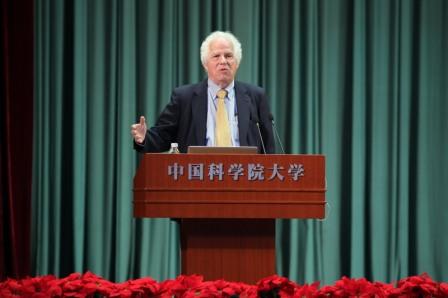
Prof. Stanley B. Prusiner, who received the 1997 Nobel Prize in Physiology or Medicine, gave a lecture at the China Science and Humanities Forum at the UCAS Yuquanlu Campus on 22 October , hosted by UCAS Vice President Su Gang.
Prof. Prusiner, who is currently Director of the Institute for Neurodegenerative Disease at University of California, San Francisco, discovered prions, a class of infectious self-reproducing pathogens primarily or solely composed of protein, which are the cause of mad cow disease and CJD.
He explained the significance and impact of prion and Alzheimer’s disease (AD) research. With the gradual increase in human lifespans, AD and other neurodegenerative diseases are becoming a chronic condition for senior citizens. Therefore prion research is essential for geriatric medicine, he said.
The professor also described the reaction mechanisms of prions and their discovery during a period when his work was largely unsupported.
During the Q&A session, Prof. Prusiner stressed the necessity of mastering more tools and channels for acquiring information, as that is essential for exploring unknown fields. As to how to improve an individual's innovative capabilities, he noted that the most innovative people throughout the past several centuries have been those who destroyed old knowledge structures and thereby changed the world.
Founded in April of 2003 and co-organized by UCAS and Higher Education Press, the China Science and Humanities Forum is a high-level seminar devoted to such issues as science and technology, the environment, education, economics, international affairs, social development and civilization, and political science.
